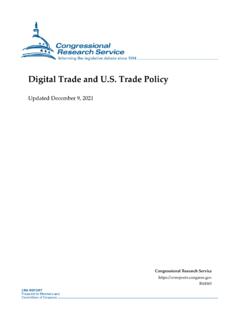Transcription of FUTURE OF WORK AND SKILLS - OECD
1 FUTURE OF work AND SKILLS . Organisation for Economic Co-operation and Development (OECD). Paper presented at the 2nd Meeting of the G20 Employment Working Group 15-17 February 2017. Hamburg, Germany 1. Summary Three ongoing mega-trends have the potential of significantly altering the nature of work in all G20. countries, albeit with different intensity: globalisation, technological progress and demographic change - as well as the changes in values and preferences that will go paired with them. Together, these trends are likely to affect the quantity and quality of jobs that are available, as well as how and by whom they will be carried out.
2 Driven by these trends, the FUTURE of work will no doubt offer unparalleled opportunities. New technologies and new markets will generate new and more productive jobs. The ability to de-bundle jobs into smaller tasks will allow work to be carried out more efficiently on a truly global, digital assembly line. In the FUTURE , workers are likely to have more say about who they work for, how much they work , as well as where and when they work . Such increased flexibility will provide greater opportunities for under- represented groups to participate into the labour market, such as women, senior workers and those with disabilities.
3 However, there are also significant challenges associated with increased globalisation, rapid technological progress and demographic change. In the advanced economies, fears around massive unemployment caused by automation and globalisation have been flagged; they are probably exaggerated, but significant upheaval is nevertheless likely as jobs are destroyed in some areas, while others emerge elsewhere. Adjustment costs may be significant and are more likely to be borne by the low-skilled as well as those currently performing more routine tasks that are more likely to be automated.
4 Combined with a general increase in the demand for higher level SKILLS , these trends may lead to further increases in inequality. Moreover, the new forms of work that are emerging raise serious concerns about the quality of jobs that are created. The emerging economies also face a number of challenges. Rapid advances in automation and the use of robots together with some re-shoring of jobs in advanced economies may limit the jobs potential of an expanding manufacturing sector. This may make it harder to escape the middle-income trap and to ensure a more even sharing of increased prosperity.
5 It could also make it harder to generate the job growth required to provide employment opportunities for the large number of young people entering the labour market each year in many of the emerging economies. Moreover, providing these large cohorts of young people with the right SKILLS to find good jobs will also be a major challenge. What is certain is that the FUTURE is uncertain. It is, therefore, difficult (if not counter-productive) to try and plan in detail for the potential changes that might affect the world of work in the years to come.
6 What is important, however, is to build resilient and adaptable labour markets that allow workers and countries to manage the transition with the least possible disruption, while maximising the potential benefits offered by the three mega-trends. G20 countries should be at the policy forefront when it comes to shaping the FUTURE of work , not least because of their economic reach but also because technological diffusion will put them at the frontier of the changes that are to come. Against this backdrop, the present concept note discusses: the mega-trends that are shaping the world of work and the challenges that they set for labour markets in G20 countries.
7 Going forward, some of these challenges include the design and implementation of policies which will: Prepare young people for the jobs of the FUTURE by ensuring that they are equipped with the right type of SKILLS to successfully navigate through an ever-changing, technology-rich work environment, and give all workers the opportunity to continuously maintain their SKILLS , upskill and/or reskill throughout their working lives. 2. Design labour market institutions ( minimum wages; employment protection; health and safety regulations) which encourage employers to seize the opportunities offered by technological change and globalisation, while making sure that the risks are not borne disproportionately by workers in the form of low pay, precariousness and poor working conditions.
8 Re-think social security systems to minimise the chances of people slipping through the holes by: (i) tailoring or adapting them to the new forms of employment; or (ii) decoupling them entirely from people's work status and history. Strengthen activation frameworks to mitigate some of the inevitable adjustment costs of moving towards more globalised and technologically advanced economies by helping those workers who have been displaced by changing SKILLS needs into a new job quickly. Promote new forms of social dialogue which allow tailored solutions to new challenges to emerge at the firm-level, while strengthening the voice of those workers who are increasingly working independently and separated by distance, language and legal context.
9 3. Mega-trends shaping the FUTURE of work Several mega-trends are sweeping across G20 countries and are changing the nature of work they affect what kind of work is done, who carries it out, and where and how it is carried out. These trends are: technological progress, demographic change, globalisation and value changes. Technological progress Technological advances are permitting an increasing number of tasks traditionally performed by humans to become automated. Initially, such automation focused primarily on routine tasks ( clerical work , bookkeeping, basic paralegal work and reporting).
10 However, with the advent of Big Data, artificial intelligence (AI), the Internet of Things and ever-increasing computing power ( the digital revolution), non-routine tasks are also increasingly likely to become automated. These changes are affecting advanced and emerging economies alike although the nature of the effect on the latter is perhaps more disputed. Some argue that emerging economies are at a comparative advantage and that new technologies will allow them to leapfrog advanced economies.















